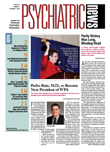Using cutting-edge technologies, scientists are discovering more about the neurological circuitry and chemistry implicated in obesity.
At a conference in early October organized by the National Hispanic Science Network on Drug Abuse, researchers presented evidence suggesting that overeating and substance abuse may be two sides of the same coin—competing addictions sharing many of the same pathways and mediators in the brain.
The dopamine signaling system in multiple regions of the brain such as the nucleus accumbens and prefrontal cortex is activated by food cues, explained Nora Volkow, M.D., director of the National Institute on Drug Abuse. This system drives us to eat and makes us feel good after eating, which are important for our survival in nature. Dopamine signaling is involved in the motivation as well as reward experienced in association with food.
Brain-imaging research reveals, however, that the dopamine system is also central to drug addiction. “Drugs activate [dopamine release] in a much more efficient and potent way than food,” said Volkow. Therefore,“ the motivational drive produced by drugs is much more intense than [that produced by] food.”
The experience of feeling high as a result of the rush of dopamine that is released is then stored as memory along with the surrounding environment. If a person with such memories is reminded of them by environmental cues, be they related to food or drugs, dopamine is released in a rush again, imaging studies reveal, and the person is motivated by a strong urge to procure drugs or food.
And it is “impossible to avoid the food cues all around us,” said Volkow. “We are bombarded with visual and other food cues in our environment every day.”
Brain-imaging studies have shown that compulsive eating shares many "characteristics with drug addiction," Volkow pointed out. The amount of dopamine receptors in the brain is also reduced in obese people, researchers have found, which mimics the down-regulation of dopamine receptors in those with long-term addiction to alcohol, heroin, or other substances. This reduction in dopamine receptors leads to reduced metabolic activities in the cingulate gyrus, prefrontal cortex, and orbitofrontal cortex, all of which are brain regions that normally exert inhibitory control to prevent one from indulging in addictive behaviors. This may explain how addiction weakens the brain's ability to suppress urges and leads to relapse.
Drug addiction is largely the result of certain substances, such as nicotine, alcohol, amphetamine, or cocaine, hijacking the natural reward system in the brain designed for food intake, Volkow suggested. “There is no survival advantage to drug addiction, but every advantage to seeking and eating food.”
This “competing addiction” hypothesis is supported as well by a different area of research. Roger McIntyre, M.D., presented evidence at the conference to show an inverse association between obesity and substance abuse among patients with bipolar disorder.
Bipolar patients often describe “a horrible loss of control when binge eating,” said McIntyre, an associate professor of psychiatry and pharmacology at the University of Toronto and the head of the Mood Disorders Psychopharmacology Unit at the University Health Network in Toronto. This sensation seems similar to the self-reported cravings for substances by people with addiction, indicating that binge eating may be just another form of addiction.
Both obesity and substance use disorder (SUD) are common in patients with bipolar disorder. Based on data collected from the Canadian Community Health Survey–Mental Health and Well-Being (CCHS), McIntyre and colleagues found that the rate of obesity in bipolar patients was significantly lower among those with SUD than those without SUD.
In addition, the rate of SUD was significantly higher in nonobese bipolar patients than in obese bipolar patients. Conducted in 2002, the CCHS was a nationwide, government-sponsored survey of 36,984 Canadians aged 15 or older.
One explanation for the link between obesity and addiction is that they are connected by the neurocircuitry that regulates the sleep-wake cycle, Luis de Lecea, Ph.D., an associate professor of psychiatry and behavioral sciences at Stanford University, suggested at the conference.
Hypocretins (also known as orexins), a type of neuropeptide released by neurons in the hypothalamus, are known to promote wakefulness and food cravings. Dysfunction in the hypocretin system has been implicated in narcolepsy/cataplexy, obesity, and addiction. De Lecea presented the findings of laboratory studies showing that hypocretin infusion can induce rats to resume cocaine self-administration after they were weaned off the drug. Conversely, giving animals a hypocretin antagonist can block stress-induced, drug-seeking behaviors. There is great interest in developing drugs to treat insomnia, obesity, and drug addiction that block hypocretin receptors, de Lecea said. ▪
